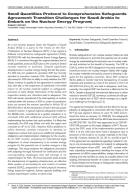Details
- Identification
- ISSN: 1977-5296, DOI: 10.3011/ESARDA.IJNSNP.2024.1
- Publication date
- 12 March 2024
- Author
- Joint Research Centre
Description
Volume: 66, December 2024, pages 2-6
Authors: Kaleem Ahmad
Sustainable Energy Technologies Center, King Saud University
Abstract: As a non-nuclear weapon State, the Kingdom of Saudi Arabia (KSA) is a party to the Treaty on the Non-Proliferation of Nuclear Weapons (NPT). It has signed a bilateral comprehensive safeguards agreement (CSA), INFCIRC/746, with the International Atomic Energy Agency (IAEA). It is monitored through the original standard text of small quantities protocol (SQP) due to the country's limited nuclear material or activities. Despite significant developments in nuclear energy during the last few years, the KSA has not updated its operative SQP but recently decided to transition towards CSA. Nevertheless, IAEA discovered in 2005 that its ability to verify whether the SQP States continue to qualify for the agreement is undermined due, inter alia, to the suspension of submission of an initial report on all nuclear material subject to safeguards, provision of early design information of the facility and inspection activity are, therefore held in abeyance. The SQP will remain operational if the total quantity of nuclear material within the territory of KSA or under its jurisdiction does not exceed the amount specified in Article 36 of INFCIRC/746 or till the introduction of fuel in the low-power research reactor. A typical regional safeguards model for the Middle East, considered as a golden standard, is to conclude CSA with additional protocol (AP) without implementing the nuclear fuel cycle activities. It is likely that eventually, the KSA may follow suit with the region and conclude an AP to its CSA. However, KSA's ambitions to utilize domestic uranium resources to develop an indigenous nuclear fuel cycle pose additional safeguards obligations and implementation challenges for the country. As an SQP country, preparing for international legal obligations to show transparency in its nuclear energy program for the peaceful use of nuclear energy is a big challenge. This essay analyses the obligations associated with adopting the legal framework for verification and the corresponding challenges that will emerge in its implementation for KSA. The most important areas include the development of regulatory infrastructure, an effective State system of accounting for and control of nuclear material (SSAC), preparation of initial physical inventory listing, inspection regimes, human capacity building, and nuclear import/export control, to name a few.
Keywords: Nuclear Safeguards, Small Quantities Protocol, Saudi Arabia, Comprehensive Safeguards Agreement
Reference guideline:
Ahmad, K. (2024, December). Small Quantities Protocol to Comprehensive Safeguards Agreement: Transition Challenges for Saudi Arabia to Embark on the Nuclear Energy Program, ESARDA Bulletin - The International Journal of Nuclear Safeguards and Non-proliferation, 66, 2-6. https://doi.org/10.3011/ESARDA.IJNSNP.2024.1

